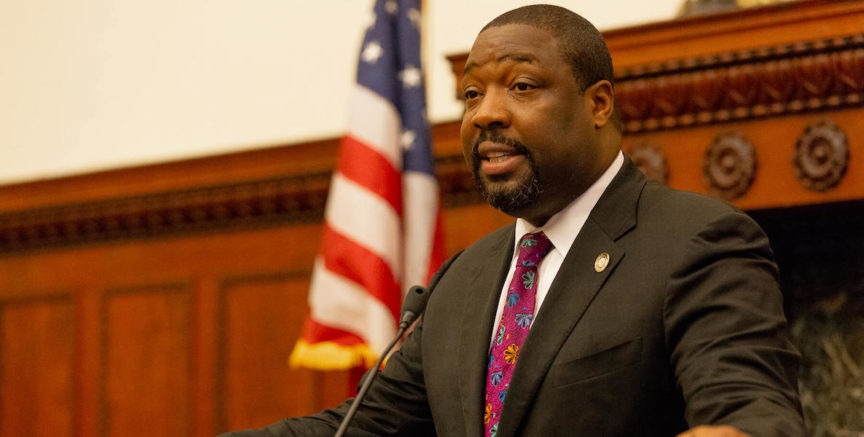HILADELPHIA, PA (January 20, 2022): Philadelphia City Councilmember Kenyatta Johnson (2nd District) introduced a resolution today calling for passage in the U.S. Senate of the John Lewis Voting Rights Advancement Act and the Freedom To Vote Act.
U.S. Senate Republicans blocked Democrats’ attempt to pass the bills on voting rights legislation yesterday (January 19). Democratic Senate leaders and President Joe Biden have said the fight for passage of the bills is not over.
“The problem of voter disenfranchisement nationwide continues to deepen,” Johnson said. “The Brennan Center found that at least 19 states passed dozens of laws just last year (2021) to make it harder to vote. Access to the ballot is the bridge between our representative democracy and the people that it serves. The John Lewis Voting Rights Advancement Act and the Freedom To Vote Act bills would fortify this bridge, which has been so undermined by a long disenfranchisement campaign targeting vulnerable Americans who most need a voice in the government. Both Democratic and Republican U.S. Senators need to do the right thing and approve the legislation right away. I want to thank my fellow Councilmembers for what I expect will be successful passage of this resolution.”
On January 13th, 2022, the U.S. House of Representatives approved a measure that combines the Freedom to Vote Act and the John Lewis Voting Rights Advancement Act into one bill.
The John Lewis Voting Rights Advancement Act was named after the late Georgia U.S. Congressman John Lewis, who died in July 2020 at the age 80. Before serving a distinguished career in Congress, Lewis was a trailblazing civil rights leader who dedicated his life to racial justice. Early in his life, he endured beatings and incarceration at demonstrations he organized as chair of the Student Non-violent Coordinating Committee and a founding member of the Freedom Riders. His unflinching activism raised public awareness of the brutality of racial injustice and helped lead to the passage of the original Voting Rights Act (VRA) in 1965.
The John Lewis Voting Rights Advancement Act responds to current conditions in voting today by restoring the full protections of the 1965 VRA. The VRA was enacted on a bipartisan basis and was reauthorized repeatedly on a bi-partisan basis over decades by Congress, most recently in 2006.
If approved, The John Lewis Voting Rights Advancement Act would establish a targeted process for reviewing voting changes in jurisdictions nationwide, with a focus on measures that have historically been used to discriminate against voters. It would also allow a federal court to order states or jurisdictions to be covered for results-based violations where a particular measure has a disparate racial impact on voting.
The John Lewis Voting Rights Advancement Act would increase transparency by requiring reasonable public notice for voting changes and would grant the U.S. Attorney General authority to request federal observers be present anywhere in the country where there is a serious threat of racial discrimination in voting. It would also increase accessibility and protections for Native American and Alaska Native voters.
The Freedom to Vote Act is a sweeping complement to the Voting Rights Act, designed to broadly increase ballot access. It would make election day a national holiday, allow for extended early voting periods, allow voting by mail without an excuse, require states to make voting more accessible to individuals with disabilities, and require states to broaden the types of required identification. It would also outlaw partisan gerrymandering and limit the ability for states to purge voter rolls.
The Pew Research Center found in a 2020 report that the United States lags most of the world’s nations in voter turnout. This voter turnout gap is highly consequential for American democracy: non-voters are disproportionately young, low-income, and non-White.
The demographics of the voter turnout gap are not coincidental. They are, in large part, due to a longstanding, sustained campaign to restrict access to the ballot.
In a 2018 report on minority voting rights access, the U.S. Commission on Civil Rights found hundreds of “harsh” and restrictive voting policies had been enacted in at least 23 states, including voter identification laws, voter roll purges, proof of citizenship measures, challenges to voter eligibility, reduce early voting, eliminate same-day voter registration, and polling-place moves or closings. The Commission also found that these policies had a “disparate impact on voters of color and poor citizens.”
Such laws have also had an impact on young voters by creating additional hurdles, such as residency requirements and strict voter ID laws, which impact their turnout at the polls. A 2014 Government Accountability Office study found that strict photo ID laws reduce turnout by 2-3 percentage points, which can translate into tens of thousands of votes lost in a single state.
The resolution is expected to come up for a final vote during the Thursday, January 272 2022 City Council session.
###


